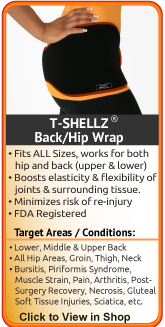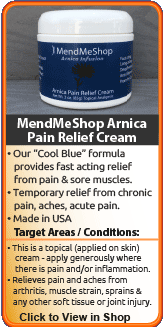|
| Hip Pointer InjuryHip Pointer Injury DiagnosisHip Pointer injury symptoms can also indicate other, very serious injuries, including organ damage - so get to a doctor! A full examination by a physician should be done to check for damage to organs in the abdominal area. An x-ray may be taken to rule out a fracture and an MRI to see the soft tissue in your hip and abdomen. This will give your doctor a clear picture of the muscles, tendons and ligaments in the area, and will allow him or her to look for any internal bleeding. Treating a Hip Pointer InjuryTreating a hip pointer injury USUALLY only requires non-invasive, conservative measures. Once you have a diagnosis by your physician, they will assign an appropriate treatment protocol. Knowing that there is often internal bleeding in these cases, it is important to follow instructions of the physician carefully. Once the injury no longer bleeds, your doctor will probably prescribe a a conservative treatment protocol adhering to the Rest.Ice.Compression.Elevation. method (RICE) - similar to protocols outlined here. Would you like to discuss your Hip Pointer Injury or other conditions with a MendMyHip Advisor?We welcome you to call our office, toll free, at 1-866-237-9608 on weekdays between 9:00am and 5:00pm Eastern Standard Time. Living with pain is never easy as it affects your entire lifestyle. Nothing is more important than making the proper decision when it comes to treating your muscle injury. Most methods only mask the problems or provide temporary relief; they do not treat the pain at its source. MendMyHip stands out in this regard as our goal is to help you heal for the longer-term. All it takes is one phone call ~ 1-866-237-9608Click HERE to Go To Our Online Store We take all major credit cards and Paypal. Product Advisors are available 9:00 am to 5:00 pm Eastern Standard Time Monday to Friday. Learn More About Hip Joint Injuries & TreatmentsI want to learn more about Hip Surgery & Post-Surgery Recovery I want to learn more about Circulation Boost I want to learn more about Ice & Heat: Which Is Better For The Hip? I want to learn more about Trigger Points in the Hip I want to learn more about Hip Surgery: Do I Need It? During your recovery, you will probably have to modify and/or eliminate any activities that cause pain or discomfort at the location of your soft tissue injury until the pain and inflammation settle. Always consult your doctor and/or Physical Therapist before using any of our outstanding products, to make sure they are right for you and your condition. The more diligent you are with your treatment and rehabilitation, the faster you will see successful results! |
   |
